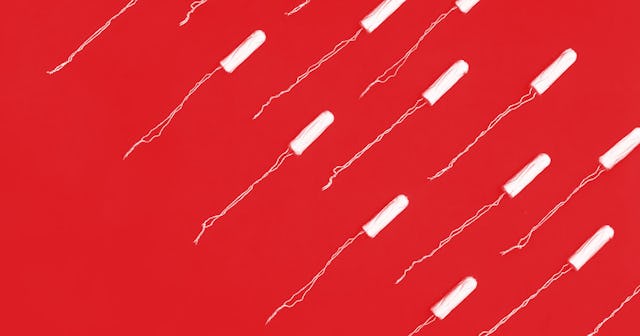Menstruation Is Not A Taboo Subject In Our Home

“Where did it go?” my then nine-year-old daughter asked, her eyes wide, as if I’d just performed a magic trick. We were standing in the bathroom, and she’d just watched me insert a silicone menstrual cup into my vagina. Ta-da!
WATCH: Tips For Dealing With the Touchy Subject of Kids and Masturbation
I hadn’t premeditated this lesson, but I also hadn’t locked the bathroom door, so when she barged in at the crucial moment and asked “What’s that?”, I showed her, in the same easy-breezy way I’d recently showed her how to gift-wrap an awkwardly shaped object and to core an apple.
My demonstration probably crossed a line of propriety. Certainly, I never saw my own mother doing anything of the sort, and maybe that’s the point. When it comes to preparing my daughter for her impending body changes, I wonder: is there such a thing as too much candidness? Because from my own adolescence, I know there is such a thing as not enough. I know that what I project about my own body, now, as my daughter discovers hers, will affect her in the future. Not to mention my son.
At the time of the menstrual cup trick, my son was ten. He had long since stopped walking in on me in the bathroom and would have been mortified to see my demonstration. Nonetheless, I wanted to enlighten him to the female cycle, hoping it would contribute to him becoming an understanding and respectful man. Our initial conversation followed an episode of Netflix’s Anne with an E, in which Anne starts her period. After watching, he asked, “Does it hurt, Mummy?”
Shortly thereafter, standing in a long line at the pharmacy, I felt that warm gush in my underwear. “My period came,” I whispered to my kids. “Can you grab tampons?” They hadn’t reappeared before I reached the cashier; I found them in the women’s health aisle, comparing boxes.
“I get it,” said my son, pointing to the tear-shaped symbols. “This one is for when Mummy has one drip of blood, and this one when she has three.” I appreciated how practical he was, how un-grossed out and how clueless. I clarified blood quantities and then explained the merits of applicators and wings.
I remember, during the human reproduction module at school, reading that women bleed for five days. Five days! My teacher assured me it wasn’t a typo and I realized, for the first time, that my mother hadn’t been entirely straight with me. It’s not that she kept me in the absolute dark. I was aware of a rattan box on the toilet cistern containing papery objects used when she “bled from her bottom.” But about the nitty-gritty she was decently vague.
Sometimes, taking a bath together, me squished against the taps, drawing on her soapy back, Mum would impart the rudiments of becoming a woman, talk euphemistically about “the curse,”or “starting.” But never did she acknowledge her own menstruation in public, in front of my father or brother, and from that I absorbed her real lesson: a woman’s cycle is an unspeakable shame.
A good daughter, I nurtured the same self-reproach. From my teens until my thirties I took the contraceptive pill, for months without pause, happy to minimize or — better — altogether avoid my period, to disconnect from the mess and inconvenience. I never admitted I was bleeding, or suffering from cramps or mood-swings, and would have rather died than ask a boyfriend or male relative to buy me sanitary products. God forbid I sprang a leak that would betray I was a normal woman.
So never mind my daughter, in the bathroom, wondering where my menstrual cup had gone. Between my inability to acknowledge my period and that moment in the bathroom, and the two years since, where is my shame?
These days, I am increasingly transparent about my cycle. The kids know when I am bloated and achy, why sometimes I eat chocolate for dinner and snuggle with a hot water bottle, why sometimes I decline to jump into cold water or flip on the trampoline. They see underwear soaking in the sink. They see blood.
That day in the bathroom, I replied to my daughter, “It’s huge up there — like the universe. It’s magical.”
After birthing my children it would have been stubborn of me to ignore my own body any longer, to refuse to be awestruck by what sorcery it was capable. I can’t explain why my own mother was excused this epiphany when she had me; are we intrinsically different or just products of our generations? For the first time in years I came off the pill and experienced a natural cycle. I acquired a menstrual cup, looked the warm dark red fluid squarely in the eyes, and was not repelled but amazed.
Today my children are older. This week, my daughter asked me to buy her a starter bra, without any of the sense of embarrassment about her body that I remember having at her age. My son is changing too; at twelve, he has discovered his reflection in the mirror, and deodorant, but not yet girls. If and when he does, I know he will be a boyfriend who willingly, un-sniggeringly, runs to the store for sanitary products. What would my mother think?
This article was originally published on